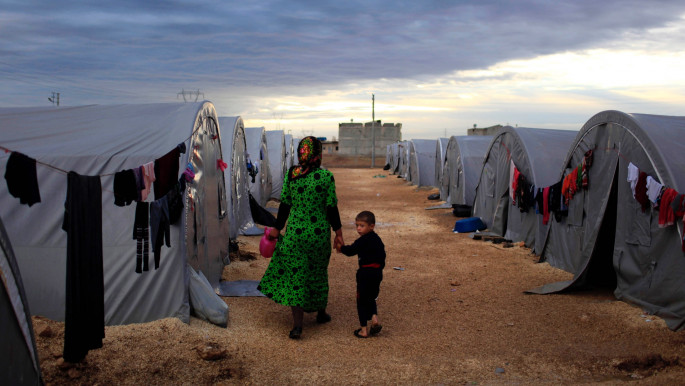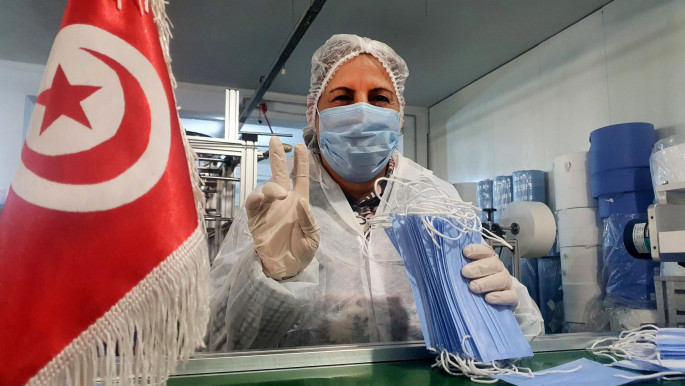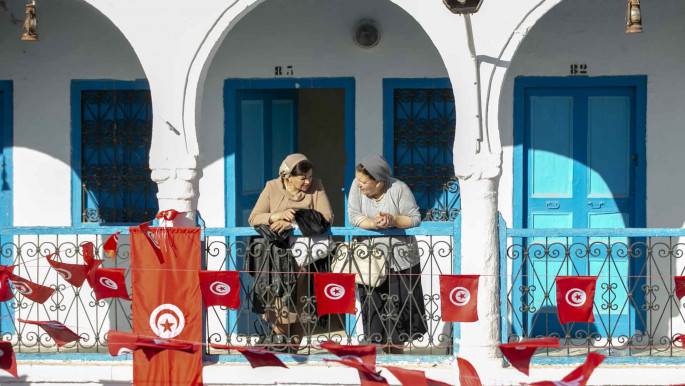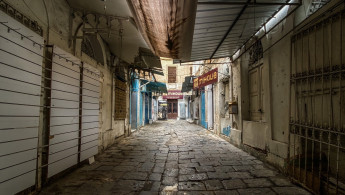'No work, no money': African migrants struggle to cope under Tunisia's coronavirus lockdown
Although no official data exists, there are an estimated 20,000 sub-Saharan Africans living in Tunisia, a large percentage of them undocumented. They are typically construction workers, cleaners, nannies, domestic workers, gardeners and students.
Many work informally, without a contract or social protection, and get paid daily. Often, they share rented apartments in groups.
Under the lockdown measures, thousands of these residents find themselves out of work with no source of income, and many are in particularly vulnerable circumstances. Some fear they will be forced out of their flats as they have not been able to pay rent since the confinement began.
Workers have either lost their income or not received their salaries, while students cannot get money orders from their families due to movement restrictions and a lack of transportation.
In a press release on 5 April, the head of the Association of Active Ivorians of Tunisia (ASSIVAT), Jean Bedel Gnabri, denounced the reported evictions for non-payment of rent in the midst of the lockdown and curfews.
 |
There are an estimated 20,000 sub-Saharan Africans living in Tunisia, a large percentage of them undocumented |  |
"We must take our responsibility by supporting each other. No Ivorian has to sleep in the streets amid this health crisis doubled by the curfew," the statement read, appealing to Ivorian community members and to the country's civil society.
Earlier this month, a round of evictions occurred in La Marsa, a suburb of Tunis, which counts around 1,000 African migrants.
"Several sub-Saharans were kicked out by the landlords because they could not pay their rent, which forced them to spend the night on the street at a time when everyone has to stay at home," the mayor of La Marsa, Moez Bouraoui, said on local radio Shems FM on 7 April.
Since 27 March, ASSIVAT has been receiving calls from many of its community members whose landlords are pressing for payment of their rents.
 |
|
| Read more: For Middle East refugees, social distancing is a privilege few can afford |
"Every day, we're getting complaints from our fellow citizens who've been given notices to leave their apartments," the association's president explained. "We're stepping in to negotiate, suspend and delay the payments, but property owners are giving them too short extensions".
Loriane Foualou, 30, from Ivory Coast, was recently threatened with eviction. Mother to a two-year-old girl, she lives in the working-class district of Bhar Lazreg, near La Marsa, sharing an apartment with another single mother, her young son and two young men.
The problem came up in early April as she and her fellow tenants could not pay the rent after the restaurants where they worked closed. They tried to reason with the house owner, but it was in vain.
"We explained the situation, asked him to be patient, and we would sort out the matter after the end of the crisis. But he wouldn't listen," the 30-year-old told The New Arab. "For two days, he turned off the electricity, gas and water to force us out".
Refusing to cooperate, the landlord told Foualou and her housemates to make their rent payments by the end of the month, or else they would have to leave. She then turned to ASSIVAT, who are trying to find a solution.
"We don't have alternative lodgings, we don't have money, there's no work," the young woman complained. "It's hard for me with my baby".
 |
Many Africans work informally, without a contract or social protection |  |
ASSIVAT has called on house owners to grant their tenants the necessary time so they can pay off their rents once economic activity resumes. It has also demanded that the Tunisian government exempt occupants from paying rent for the lockdown period, and to compensate landlords in the interim.
Following Gnabri's appeal, a number of businessmen and members of the civil society came forth and either committed to paying debit rents to some of the affected lodgers, or even offering temporary accommodation in their homes.
Read more: Trapped in Lebanon: Fears of abuse for migrant domestic workers amid Covid-19 lockdown
From the beginning of April, the Association of African Students and Interns in Tunisia (AESAT) has been recording daily requests of help from young people at risk of eviction. Last week, a Tunisian lady residing in France contacted the association and helped a group of six students in difficulties by sending money to cover their rent and bills.
For the vast majority, African nationals work as daily labourers, a lot of them serve, cook or clean in cafes and restaurants. After the closure of food and beverage establishments, these workers fell into extreme financial insecurity.
 |
|
| Read more: 'Patriotic' Tunisians self-isolate in factory to make masks for healthcare workers battling coronavirus |
In the face of the pandemic and the heavy economic impact of the lockdown on the African population, the African Solidarity Cell Covid-19 Tunisia was created at the end of March by several sub-Saharan migrant associations. It represents nationals from the Ivory Coast, Senegal, Burkina Faso, Congo, Cameroon and Mali who live in Tunisia.
Its aim is "to come to the aid while bringing assistance to the sub-Saharan migrants in situation of vulnerability in this period of health crisis via calls for donations; food vouchers and medical aid which will then be redistributed".
The cell seeks to help its community members living in difficult situations, whether they are students or workers, or with a legal status or not. It also coordinates all aid provided to the African community with Tunisian associations, international NGOs and representatives of the state, in order to avoid duplication of efforts.
Jean Ferdinand Mohenou, president of AESAT, which is part of the partner associations, explained how the solidarity network carries out its work on the ground.
"We identify those in need of help, and register their names and addresses on a database, while prioritising the most vulnerable, meaning pregnant women, single mothers with their children and sick people to reach out to these subjects first," he said.
 |
Civil society groups have demanded stronger measures to protect migrants in the fight against Covid-19 |  |
Next, the concerned organisations will collect funds and food donations, then redistribute food items, cleaning products and health assistance to the targeted families.
The cell relies on a host of representatives scattered across different cities to better respond to people's needs in various local communities as and when demands for help arise.
Gnabri mentioned that a major problem the network faces is with "obtaining permits" to enable the associations with their volunteers to move around during the time of confinement and "to access vulnerable migrants".
Read more: Tunisia's groundbreaking first woman doctor honoured on new banknote
Alongside the Sub-Saharan civil society's cell, Tunisian associations, municipalities and citizens of goodwill have mobilised to collect aid addressed to African residents, delivering prompt solidarity actions around Tunis and beyond.
Largely isolated, with insufficient resources, and no access to healthcare, Tunisia's African community, the majority of whom are irregular workers, has become further disadvantaged amid the coronavirus crisis.
 |
|
| Read more: A shared heritage: Cause for optimism as Tunisia plans first Jewish museum |
A little relief came on 8 April when the Tunisian government took a series of measures in favour of foreigners, notably Africans, who reside in the country. Authorities decided to extend residence periods starting from 1 March until the end of the pandemic, thus suspending penalty fees. They also requested that landlords freeze payment of rent for April and May. In addition, those in difficulties will be able to claim aid and financial assistance.
Notwithstanding the positive steps adopted by the Tunisian state, civil society groups have demanded stronger measures to protect migrants in the fight against Covid-19.
The Tunisian Forum for Economic and Social Rights (FTDES) issued a statement calling for the "regularisation of migrants" on Tunisian soil, together with a "national initiative" aimed at guaranteeing health rights for migrants to enable their access to healthcare, and provide them with emergency aid at the present critical time.
African civil society groups have come forward pushing for other decisions that should not just better protect migrants, but really integrate them into Tunisian society.
Their demands include the mass regularisation of Africans who have lived in the country for at least two years, granting legal recognition and a social status to all workers, fixing the price of residence permits for students at 75 Tunisian dinars $25) for the full academic year (with no penalty applied), and securing a legal status for the migrants' children born on Tunisian territory.
Representatives of 58 Tunisian organisations and associations filed a request last week to the Minister of Human Rights and Relations with Constitutional Authorities and Civil Society, Ayachi Hammami, to regulate the situation of African migrants in Tunisia.
Alessandra Bajec is a freelance journalist currently based in Tunis.
Follow her on Twitter: @AlessandraBajec


![Minnesota Tim Walz is working to court Muslim voters. [Getty]](/sites/default/files/styles/image_684x385/public/2169747529.jpeg?h=a5f2f23a&itok=b63Wif2V)






